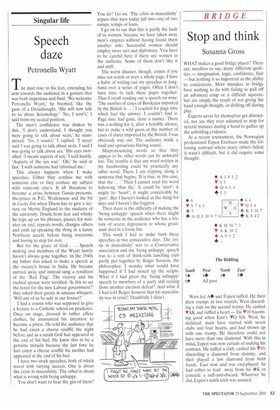Speech daze
Petronella Wyatt
The man rose to his feet, extending his arm towards the audience in a gesture that was both imperious and final. 'We welcome Petronella Wyatt,' he boomed, like the guns of a Dreadnought. 'She will now talk to us about Scientology."No, I won't,' I said from my seated position.
The man's confidence was shaken by this. 'I don't understand, I thought you were going to talk about sects,' he stammered. 'No, I wasn't,' I replied. 'I never said I was going to talk about sects. I said I was going to talk about sex.' His eyes swivelled. 'I meant aspects of sex,' I said hastily. 'Aspects of the sex war.' Oh,' he said at last. 'I wish someone had informed me.'
This always happens when I make speeches. Either they confuse me with someone else or they confuse my subject with someone else's. It all threatens to become a cross between Gussie-presentsthe-prizes in P.G. Wodehouse and the bit in Lucky Jim when Dixon has to give a lecture on Merrie England to the students of the university. Drunk from fear and whisky he trips up on his phrases, pauses for minutes on end, repeats words, changes others and ends up speaking the thing in a funny Northern accent before being overcome and having to stop for ever.
But for the grace of God . . . Speech making and members of the Wyatt family haven't always gone together. In the 1940s my father was asked to make a speech at the viceroy's house in India. He became carried away and instead sang a rendition of the 'Red Flag'. The viceroy and his exalted spouse were terrified. 'Is this to set the tenor for the new Labour government?' they asked their guests in anxious whispers. Will any of us be safe in our houses?'
I had a cousin who was supposed to give a lecture to a Catholic school on prudence. Once on stage, dressed in rather effete clothes, he announced his intention to become a priest. He told the audience that he had eaten a cheese soufflé the night before and as a result God had appeared at the end of his bed. He knew this to be a genuine miracle because the last time he had eaten a cheese soufflé his mother had appeared at the end of his bed.
I have two stock speeches, both of which travel with varying success. One is about the crisis in masculinity. The other is about what is wrong with being unhappy.
You don't want to hear the gist of them? You do? Go on. 'The crisis in masculinity' argues that men today fall into one of two camps, wimps or louts.
I go on to say that this is partly the fault of us women, because we have taken away men's empires without having found them another role. Successful women should employ more tact and diplomacy. You have to be careful here if there are women in the audience. Some of them don't like it and sniff.
The worst disaster, though, comes if you miss out words or even a whole page. I have a habit of writing out my speeches in longhand over a series of pages. Often I don't have time to tack these pages together. Thus I recall reading out a speech on wine: 'The number of cases of Bordeaux imported by the British is ..' I reached for page nine which had the answer. I couldn't find it. Page nine had gone, done a runner. There was a nothing for it, after a horrible silence, but to make a wild guess at the number of cases of claret imported by the British. I was obviously way out. The audience made a loud and uproarious blaring sound.
Mispronouncing words so that they appear to be other words can be awkward too. The trouble is that any word written in my handwriting could be practically any other word. There I am tripping along a sentence that begins. 'It is true, in this case, that the . . .' Then I cannot read the word following 'that the'. It could be 'start': it might be 'heart': it might conceivably be 'part'. But I haven't looked at the thing for days and I haven't the foggiest.
Then there is the difficulty of making the 'being unhappy' speech when there might be someone in the audience who has a history of severe depression or whose greataunt died in a loony bin.
This week I had to make both these speeches in two consecutive days. The 'crisis in masculinity' was to a Conservative association and the 'being unhappy' speech was to a sort of think-tank lunching club partly put together by Roger Scruton, the philosopher. I wonder what would have happened if I had mixed up the scripts. What if I had given the 'being unhappy' speech to members of a party still reeling from another election defeat? And what if I had told Roger Scruton that his masculinity was in crisis? Thankfully I didn't.






































































 Previous page
Previous page